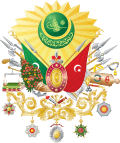The resm-i bennâk was a tax on peasants who had little or no land - those who did not pay the resm-i çift - in the Ottoman Empire. The name is probably...
4 KB (565 words) - 03:21, 1 February 2024
continuing to pay their "old" rate of tax. Landless peasants might pay Resm-i bennâk instead. ACCOUNTING METHOD USED BY OTTOMANS FOR 500 YEARS: STAIRS (MERDIBAN)...
4 KB (549 words) - 01:03, 27 July 2022
The resm-i dönüm was a land tax in the Ottoman Empire; it was a divani tax paid each year to the landowner or timar holder, typically on 1 March. The resm-i...
4 KB (479 words) - 17:06, 3 December 2023
The resm-i hınzır ("Pig tax") was a tax on pigs in the Ottoman empire. Although pork was theoretically banned in the Ottoman empire, some trade continued...
954 bytes (108 words) - 00:51, 23 August 2019
The resm-i mücerred was a bachelor tax in the Ottoman Empire, related to the resm-i çift and the resm-i bennâk. The amount payable varied from year to...
4 KB (459 words) - 11:03, 9 August 2023
The resm-i sicill[what language is this?] was a tax in the Ottoman empire; it was a fixed fee for recording a case in a kadı's records. Kadı. Markus Wiener...
463 bytes (41 words) - 01:32, 1 February 2023
The resm-i arus, or resm-i arusane, was a feudal bride-tax in the Ottoman Empire. It was typically a fixed fee, a divani tax; it was paid around the time...
4 KB (508 words) - 17:48, 26 June 2023
Taxation in the Ottoman Empire (redirect from Bad-i hava)
different taxes applied to different religious and ethnic groups; Muslims paid resm-i çift whilst non-Muslims paid İspençe. These taxes might be further graduated...
17 KB (2,278 words) - 20:00, 26 January 2024
adet-i ağnam (literally meaning "sheep number") was an annual tax on sheep and goats in the Ottoman Empire. Initially, the tax was known as resm-i ağnam;...
7 KB (820 words) - 18:58, 10 April 2023
2009). Pamuk, Şevket. "The Ottoman Economy in World War I." in The Economics of World War I (2005): 112-36. Quataert, Donald (1975). "Dilemma of development:...
53 KB (6,654 words) - 07:50, 1 November 2024
hands to the hands of the receiver" just as we say "I spoke to him mouth to mouth", we also say, "I gave it to him hand to hand"'. M.J. Kister understands...
185 KB (23,403 words) - 05:19, 24 November 2024
his government. After Ali, his supporters refused to pay zakat to Muawiyah I, as they did not recognize his legitimacy. The practice of Islamic state-administered...
57 KB (6,739 words) - 01:32, 11 November 2024
عمومیهٔ عثمانیه واردات مخصصه ادارهسی, romanized: Düyun-u Umumiye-i Osmaniye Varidat-ı Muhassasa İdaresi, or simply Düyun-u Umumiye as it was popularly...
6 KB (672 words) - 04:07, 22 November 2024
direct Quranic injunction regarding waqf, it can be inferred from Surah Al-i'-Imran (3:92): "You will never achieve righteousness until you donate some...
55 KB (6,358 words) - 02:49, 5 November 2024
Tanzimat (category Abdulmejid I)
Judicial Ordinances [tr] (Meclis-i Vâlâ-yı Ahkâm-ı Adliye) passed to the Council of Reorganization (Meclis-i Âli-i Tanzimat) (1854) Establishment of...
37 KB (4,195 words) - 04:26, 9 November 2024
Rav akçesi Resm-i arusane Resm-i bennâk Resm-i bostan Resm-i çift Resm-i dönüm Resm-i filori Resm-i ganem Resm-i hınzır Resm-i mücerred Resm-i sicill Rusum-e-eflak...
2 KB (206 words) - 19:47, 31 October 2024
Joint Tax Returns Always Best?". The National Public Accountant. Montanari, I. (2000-01-01). "From Family Wage to Marriage Subsidy and Child Benefits: Controversy...
28 KB (2,060 words) - 14:06, 12 November 2024
the millet system was a tradition dating back to the reign of Sultan Mehmed I (r. 1413–1421). Many historians have accepted this claim and assumed that...
48 KB (5,793 words) - 22:32, 9 November 2024
The Ottoman Tobacco Company, (Memalik-i Şahane Duhanları Müşterekül Menfaa Reji Şirketi) also known as the Régie Company for its French official name...
4 KB (442 words) - 05:30, 23 December 2023
Malikâne (redirect from Mâl-i mueccele)
Rav akçesi Resm-i arusane Resm-i bennâk Resm-i bostan Resm-i çift Resm-i dönüm Resm-i filori Resm-i ganem Resm-i hınzır Resm-i mücerred Resm-i sicill Rusum-e-eflak...
3 KB (440 words) - 20:31, 31 March 2024
Rav akçesi Resm-i arusane Resm-i bennâk Resm-i bostan Resm-i çift Resm-i dönüm Resm-i filori Resm-i ganem Resm-i hınzır Resm-i mücerred Resm-i sicill Rusum-e-eflak...
2 KB (257 words) - 11:27, 24 October 2024
Rav akçesi Resm-i arusane Resm-i bennâk Resm-i bostan Resm-i çift Resm-i dönüm Resm-i filori Resm-i ganem Resm-i hınzır Resm-i mücerred Resm-i sicill Rusum-e-eflak...
4 KB (470 words) - 03:01, 13 July 2024
Ispendje (redirect from Resm-i İspenç)
parts of the Ottoman Empire; its counterpart, for Muslim taxpayers, was the resm-i çift - which was set at slightly lower rate. The treasury was well aware...
4 KB (461 words) - 16:02, 22 September 2024
Rav akçesi Resm-i arusane Resm-i bennâk Resm-i bostan Resm-i çift Resm-i dönüm Resm-i filori Resm-i ganem Resm-i hınzır Resm-i mücerred Resm-i sicill Rusum-e-eflak...
7 KB (850 words) - 21:38, 7 November 2024
adet-i deştbani (sometimes known as resm-i destbani) was a charge, or tax, in the Ottoman Empire, which was a penalty for crop damage. The adet-i deştbani...
3 KB (465 words) - 18:30, 16 August 2021
Rav akçesi Resm-i arusane Resm-i bennâk Resm-i bostan Resm-i çift Resm-i dönüm Resm-i filori Resm-i ganem Resm-i hınzır Resm-i mücerred Resm-i sicill Rusum-e-eflak...
2 KB (199 words) - 05:09, 11 November 2024
urban population would be exempted from some of the taxes on raya, such as resm-i çift. Taxation in the Ottoman Empire was complex, including various routine...
4 KB (468 words) - 00:51, 7 January 2023
died or left. After paying tapu resmi, a farmer would still have to pay resm-i çift (or an equivalent tax) each year. Land which was newly brought under...
4 KB (517 words) - 12:30, 12 December 2023
Under the Ottoman Empire, Muqata'ah or Mukata'a were hass-ı hümayun, parcels of land owned by the Ottoman crown. These were distributed through the iltizam...
5 KB (679 words) - 18:32, 28 April 2024
Ottoman accountants, although their official title was halife. The Risale-i Felekiyye, written in 1363 by Abdullah bin Muhammad bin Kiya Al-Mazandarani...
5 KB (576 words) - 04:21, 8 October 2024






